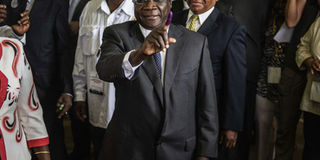Amid row in Maputo, eyes on Lesotho poll

Mr Afonso Dhlakama, a former Renamo rebel chief turned Opposition leader, whose party has rejected the provisional results of the recently concluded presidential poll. Mr Dhlakama is running for the seat for the fifth time. PHOTO | GIANLUIGI GUERCIA |
What you need to know:
- Rejection of provisional results in Mozambique raises the spectre of post-election violence
- It apparently did not matter that the definitive results had not yet been announced, or that international observers had on Friday given the just ended polls a relatively clean bill of health.
As the week ended, there were alarming reports that the opposition Renamo party had already rejected the provisional results of the presidential and legislative polls held in Mozambique last Wednesday.
It apparently did not matter that the definitive results had not yet been announced, or that international observers had on Friday given the just ended polls a relatively clean bill of health.
Among those who had their thumbs up for the polls were observers for the 15-member Southern African Development Community (SADC) regional bloc. Avowedly impressed, they reportedly said that the elections “were generally peaceful, transparent, free and fair and credible”.
That assessment was not shared by the jittery Mozambican opposition, though, and Renamo was quick to raise the red flag even as the early tallies and projections were showing that the ruling party Frelimo’s presidential candidate Filipe Nyusi was headed for victory with around 60 per cent of the vote.
He was clearly well ahead of Renamo’s Afonso Dhlakama, who had garnered about 30 per cent of the ballots.
Reportedly claiming its candidate had won outright, Renamo said the vote had been seriously flawed and charged that there had been “serious irregularities”.
It also claimed that the perceived shortcomings included people voting more than once, ballot stuffing and polls opening late or not at all.
Whatever the merits or demerits of the Renamo claim, it had the definite effect of once again raising the spectre of post-election violence in Mozambique.
Clearly, that was a frightful prospect for a country that has endured a catastrophic civil war in the past, and which has been seeking elusive political stability since it gained independence from Portugal in 1975.
The recent developments in Mozambique certainly raised anxiety regarding the forthcoming General Election in Botswana, which are slated for next Friday and are widely deemed the most competitive in the history of the country.
Eagerly awaited, the polls signify a new push for regime change in a country that, like Mozambique, has been ruled by the same political party since independence from Britain in 1966.
However, already there are indications that the looming presidential and parliamentary elections will be a major test for the ruling Botswana Democratic Party (BDP), which by all indications has not been sitting easy in recent times.
Poignantly the ruling party, led by incumbent President Seretse Khama Ian Khama, goes to the polls after experiencing a major split for the first time in 2010, a development that resulted in the formation of the Botswana Movement for Democracy (BMD).
The forthcoming election will be the first one after the 2010 split, whose impact is likely to be reflected in the election results.
Battling the ruling BPP will be the Botswana Congress Party (BCP). Led by seasoned parliamentarian Dumelang Saleshando, the party recently launched its manifesto, and will be contesting in 54 out of 57 constituencies up for the take.
Also in the fray will be the Umbrella for Democratic Change (UDC), a formidable coalition of the Botswana Movement for Democracy (BMD), Botswana National Front (BNF) and the Botswana Peoples Party (BPP). Led by flamboyant Harvard-trained human rights lawyer Duma Boko, the UDC’s manifesto is ‘Embrace Change— Real Change.’
As for incumbent Khama, he is a former general who served as the country’s vice-President before succeeding the much-respected former president Festus Mogae following the latter’s retirement in 2008.
The scion of Botswana’s founding President Sir Seretse Khama, the incumbent was later elected as the president during the 2009’s General Election, and has been serving comfortably as Botswana’s fourth president since independence. This time around, though, his BDP is facing challenges it cannot take for granted.
For many observers, however, when all the chips are finally down the ruling party is expected to comfortably carry the day, romping home and ensuring another five-year term for incumbent President Khama.
In the meantime, there are hopes that the Botswana poll results will not be seriously challenged, as is happening in volatile Mozambique.





